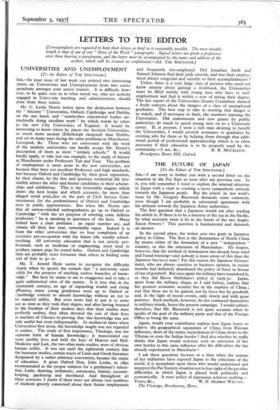THE FUTURE OF JAPAN [To the Editor of THE SPECTATOR.]
SIR,—I am sorry to bother you with a second letter on the situation in the Far East so soon after my previous one. In it, you will remember I tried to explain the internal situation in Japan with a view to creating a more sympathetic attitude towards the Japanese people. But the article in last week's issue by Mr. Gregory Bienstock demands some comment, even though I am probably in substantial agreement with his attitude towards the Japanese Army authorities.
The first question that a Japanese would ask after reading his article is, If there is to be a mastery of the sea in the Pacific, by what necessity must it be in the hands of the two Anglo- Saxon Powers ? This question is fundamental and demands an answer: In the second place, the writer sees two goals in Japanese policy in China. The first is the domination of North China by means either of the formation of a new " independent " country, or else the extension of Manchukuo. He forgets, however, that the method of domination has already been tried and found wanting—and nobody is more aware of this than the Japanese business man ! For this reason the Japanese Govern- ment, who are always sensitive to business opinion, in recent months had definitely abandoned the policy of force in favour of one of goodwill. But once again the military have torpedoed it, as they did Baron Shidehara's policy in 1929-31. Japan, apart from the military clique, as I said before, realises that her greatest economic security lies in the markets of China ; and that these are to be gained, not by force but by goodwill, and, in the light of recent events, only slowly and with great patience. Such methods, however, do not commend themselves to military minds, hence the present campaign. I would submit, therefore, that Mr. Bienstock is not quite accurate when he speaks of the goal of the military party and that of the Foreign Office as being the same.
Again, would your contributor explain how Japan hopes to achieve the geographical separation of China from Russian influence, short of the entire encirclement of China down to the Tibetan or even the Indian border ? And also whether he really thinks that Japan would welcome such an extension of her own border to this same influence after the difficulties she has already experienced in Manchuria ?
I ask these questions because at a time when the actions of her militarists have exposed Japan to the criticisms of the world, it is incumbent upon those who would understand and interpret the Far Eastern situation not to lose sight of the peculiar difficulties in which Japan is placed both politically and economically. A mere policy of repression achieves nothing.—










































 Previous page
Previous page